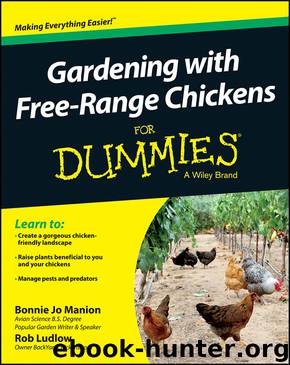Gardening with Free-Range Chickens For Dummies by Bonnie Jo Manion

Author:Bonnie Jo Manion
Language: eng
Format: epub
Publisher: Wiley
Published: 2013-06-05T16:00:00+00:00
Figure 5-2: Some common wire fencing, clockwise from top left: Rabbit Wire, 1⁄4” wire hardware cloth, and chain link.
Chain link: Used commercially in landscapes. It’s commonly used as periphery property fencing. Usually 6' high with sharp edges on top. Grounded with heavy metal poles. Coyotes and raccoons can potentially scale a standard chain link fence.
Agricultural fencing: Used on farms and ranches. It’s sturdy, and is usually in 4" oblong openings. It isn’t always predator proof.
Wire hardware cloth: Available in different sizes. The 1⁄2" size is perfect for creating a protected chicken outdoor pen, and burying it 1-1½" below soil level. See Figure 2-5 for an illustration. Wire hardware cloth is the ideal fencing material for permanent chicken runs. It also is available in 1⁄4" size as an option for covering and securing small areas like chicken coop windows, or vent areas. Wire hardware cloth is predator proof. Although mice are not predators, they are an unwelcome presence around your chicken coop because of disease, parasites, feed loss and more. Be aware that determined mice can sometimes squeeze through ½" wire hardware cloth.
Rabbit fencing: Available in rolls and is 3' high. It typically has smaller 1" x 4" openings on the bottom edge, increasing to larger 4" x 4" openings on top. This fencing is durable, and it requires poles or metal T-bars to stabilize it. This type of fencing is best for surrounding raised vegetable beds, temporary chicken runs, and temporary fencing. If you’re lucky, it will keep out rabbits.
Chicken wire: Available in rolls and is 3' high. It’s typically octagonal-shaped wire, a lighter weight wire. It rusts easily, and could potentially be chewed through. It requires poles or stability of some kind. It could be used for temporary chicken runs to protect your plants from chickens. It isn’t effective against any predators.
Electrical wire: Creates an electrical circuit that uncomfortably shocks animals and humans when they touch it. It’s a high-tension single wire, usually used in conjunction with another type of fence. It’s popular for agricultural and ranch purposes. It requires a power source to operate. Sometimes power sources break, power sources can potentially start a fire, and wet vegetation can short out the fence. It’s very effective with dogs and large-sized predators. Electric fencing can now be solar powered, too.
Wire fencing is a handy tool material when raising chickens in your garden. Each type of fencing has attributes for different uses. Familiarize yourself with the various types of fencing. Don’t be afraid to mix and match wire fencing for the different purposes involved with raising chickens in your garden.
We recommend a tall 6' chain link fence or higher for a perimeter fence. Use wire hardware cloth extensively for covering windows in chicken coops and outside pens. Wire hardware cloth should be used for chicken runs, once again because it is predator proof. Don’t be mislead, chicken wire, agricultural wire, and rabbit wire are good for protecting prize plants, or temporary chicken runs, and temporary fencing, but it is not predator proof.
Download
This site does not store any files on its server. We only index and link to content provided by other sites. Please contact the content providers to delete copyright contents if any and email us, we'll remove relevant links or contents immediately.
Turbulence by E. J. Noyes(8014)
The Thirst by Nesbo Jo(6921)
Gerald's Game by Stephen King(4633)
Be in a Treehouse by Pete Nelson(4029)
Marijuana Grower's Handbook by Ed Rosenthal(3668)
The Sprouting Book by Ann Wigmore(3580)
The Red Files by Lee Winter(3409)
The Remains of the Day by Kazuo Ishiguro(3388)
Sharp Objects: A Novel by Gillian Flynn(3003)
Organic Mushroom Farming and Mycoremediation by Tradd Cotter(2684)
Christian (The Protectors Book 1) by L. Ann Marie(2678)
The Culinary Herbal by Susan Belsinger(2470)
Stone Building by Kevin Gardner(2386)
The Starter Garden Handbook by Alice Mary Alvrez(2329)
Lilac Girls by Martha Hall Kelly(2288)
The Unlikely Pilgrimage of Harold Fry by Rachel Joyce(2260)
The Lean Farm Guide to Growing Vegetables: More In-Depth Lean Techniques for Efficient Organic Production by Ben Hartman(2123)
Urban Farming by Thomas Fox(2099)
Backyard Woodland by Josh VanBrakle(1921)
